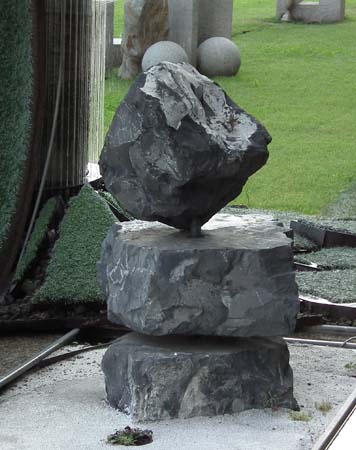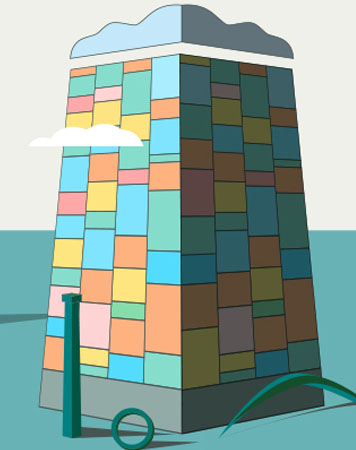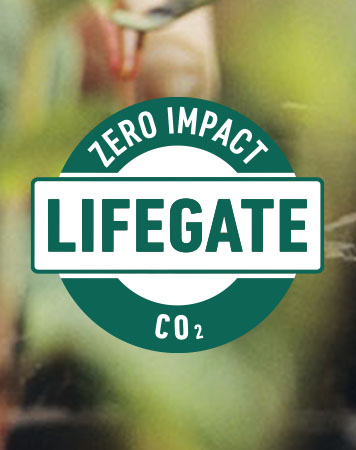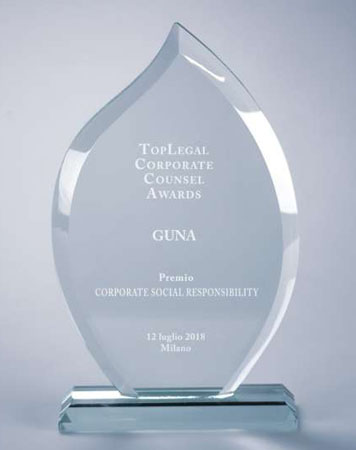Our Philosophy
We have also decided to open ourselves up to a process of transparency and sharing not only the values but also the tools used to describe them. Therefore, we have published our integrated report – which includes all the company’s financial information, ongoing projects, and their impact on the company – in a dedicated web space, the “Social Hub”, available for consultation and interaction with the company’s stakeholders. If we state that there must be a total coincidence and overlapping of interests between the company and its stakeholders, the act of reporting can no longer make any sense if prepared by the company itself without the collaboration of all its stakeholders. Therefore, GUNA’s integrated report is the result of a “choral” cooperation of GUNA with its stakeholders, based on a complex “container of dynamic indicators” which is filled in each year with data, tables, information, and above all stories, in a 365-day journey, “built” together with all the company’s departments and all the company’s stakeholders, who can access the Social Hub and tell the story they are involved in from their personal viewpoint. This is how the first ever published “real-time” social report was born, which represents for GUNA an important distinguishing tool compared to its competitors and an effective means of dialogue between GUNA and its stakeholders.

Integrated reporting

We apply practical principles of social responsibility to our work. We are aware that the purpose of a company is to produce profits, and we recognize it without hypocrisy, but we are also convinced that there is a business model that makes the interests of shareholders compatible with those of the community. Whenever the community evolves and improves its standard of living, we can also give greater boost to our activities: we could therefore say that the interests of the community and of our shareholders coincide. We have therefore changed and improved our strategies, orienting them in the light of corporate social responsibility, without any additional costs for our customers and patients. We believe that the responsibility of applying these principles cannot be “dumped” on the end user, but it must be a cost to be charged directly to our company. We have also made “strong” choices regarding patent protection and the protection of our intellectual works, including the results of scientific research, giving up patent protection on all our products and processes: in order to analyse this aspect, we recommend reading the short note on the “No Patent” Manifesto.
Our Commitment
In GUNA a team is working on the above-mentioned aspects. It is composed of 1 internal full-time employee and 3 part-time outside workers (1 university professor and 2 co-workers), for an average total of 70 working days/worker per year. 21 projects of environmental sustainability and social responsibility are currently ongoing and being financed, in various sectors, such as:
- reduce the environmental impact of production
- improve the social conditions of the territory
- reduce inequalities in developing countries
- improve the internal working environment in Guna
- motivate suppliers to raise their ethical concerns in the business field
- train the journalist community on topics related to natural and complementary Medicines
- train the new generations on correct lifestyles and disease prevention
- promote advocacy projects before institutions to facilitate the acceptance of a care system based on natural and complementary medicines

Our Ongoing Projects

Energy Saving”: how to reduce environmental impact
Trigeneration (CCHP) is an efficient system of combined production of electricity, heat and cold from a single plant: it is cogeneration (CHP), to which a refrigerating machine is combined to produce cold in the form of chilled water, thus reducing the environmental impact due to building air conditioning system. Compared to the single production of heat and electricity, trigeneration allows you to fully exploit the potential of the system even in summer, when heating is no longer required. Starting from the fuel in a gaseous form, the trigeneration process allows to obtain electricity, hot fluids for heating and cold fluids for conditioning. Thanks to the trigeneration system that has been installed in GUNA, it is possible to obtain several benefits:
- Energy saving thanks to reduced fuel use;
- Economic savings: the installation allows savings by approximately 20-30% compared to the use of traditional methods;
- Environmental savings thanks to reduced CO2 emissions;
- Increased reliability and independence from traditional forms of electricity supply.
The total yearly CO2 emissions into the atmosphere before the co-generator installation to meet the energy needs of the plant were about 1.189 tons. Based on the consumption data reported, and from the simulations of the “REC +” system, we could conclude that the CO2 emissions balance could be of 150 tons of CO2, equivalent to avoiding the annual emissions of 60 cars, or – in other terms – the product savings is equivalent to preserving 35 hectares of forest. Moreover, this innovative heating/cooling system allows significant savings for the company, with a lower financial outlay, the amount of which will be invested in scientific research in the pharmaceutical field, thus contributing to further innovation and resulting in improved population’s health standards. Furthermore, although the “Energy Saving” project allows us to optimize consumption and reduce our environmental impact, greenhouse gas emissions are nevertheless part of any industrial cycle. Since 2008, therefore, we have been joining Impatto Zero®, the LifeGate project that calculates, reduces and compensates the CO2emissions generated by activities, products, services and events contributing to the creation and protection of growing forests in Italy and in developing countries. Therefore, we have reported the consumption generated by the activities of our plant in Milan to Impatto Zero®. In the last 8 years we have contributed to the creation and protection of an annual average of over 472 thousand square meters of forest in Costa Rica, equal to about 45,600 car parking areas. Our partner LifeGate has chosen the state of Costa Rica for its exceptional concentration of biodiversity: it is home to 4 percent of all living species on the planet, even if its surface accounts for only 0.01 percent of the land above sea level. Some recent brave conservation-oriented environmental policies have minimized human impact on the environment. The deforestation activity that has devastated the territory in the last 60 years has in fact been curbed and thanks to this trend reversal, 27% of Costa Rica’s territory is currently composed of protected areas. Moreover, thanks to the partnership with LifeGate, we have also been making up for the emissions of CO2generated by the activity of our servers and our websites for some years. Zero Impact®Web is a project that was born with the aim of reducing and making up for the carbon dioxide emissions deriving from the use of the Internet, whose operation always consumes much energy. The project aims to promote greater environmental awareness among its stakeholders, with the awareness that only a more environmentally friendly attitude can contribute to slowing the planet’s global warming process, which has recently reached record levels. Finally, GUNA has joined the project “Bee my Future“, born in 2015 and developed in collaboration with the Association of the Beekeepers of the Province of Milan, to protect bees in urban settings through organic farming entrusted to a network of expert amateur beekeepers a few kilometres from Milan in an uncontaminated area rich in biodiversity. Synthetic chemical pesticides are one of the main causes for the death of bees. Beekeeping according to organic principles is essential to ensure bees health, using natural materials for apiaries and placing them in areas where there are mainly crops and spontaneous vegetation. GUNA has chosen to protect urban bees because besides improving our dietary security, they preserve and enhance the urban biodiversity, in line with the principle of general well-being to be extended also to the future generations.
Human rights and non-violence: respecting diversity
The concept of “non-violence” has always been included in GUNA philosophy. To give due importance to this issue, GUNA created – the first company in the world – the role of the “Peace Manager“, in the person of Antonella Zaghini, member of the Presidency staff, who organizes corporate events about non-violence. Antonella took part in the extraordinary experience of the World March for Peace and Nonviolence – a social awareness initiative that took place, with over 300 events and an itinerary of 190,000 kilometres in 98 countries around the world, thanks also to GUNA funding. Then, she was entrusted with the organization of the “Corporate Non-Violence Day“, which has been arranged since 2010, every year on 2 October. This date has a deep symbolic meaning, as it is the Mahatma Gandhi’s birthday. The idea underlying this project is to demonstrate – through theoretical lectures by influential speakers each year, but also through “practical” workshops – how the seemingly “high” concepts of peace and non-violence can be effectively applied to everyone’s daily life, to resolve disputes in the workplace as well as at home, thus improving our life quality.
“Natura che Cura: il Medico racconta…” (in English: “Nature that Cures: doctors tell that…”)
This is a multi-year project born in 2009 in close collaboration with a team of doctors specialized in Homotoxicology. GUNA has created a multimedia kit to deepen students’ knowledge on biological and natural medicines and to raise awareness on the correct lifestyles and disease prevention. Our “non-invasive” ethical rules state that no direct marketing action can be promoted on minors, in order to avoid the risk of surreptitious use of drugs; we have therefore decided not to make the GUNA logo appear on the project materials intended for children, and any reference to GUNA products or services is forbidden during the lesson, thus giving priority to the educational value of the project. This training and awareness program, which has been going on for 8 years, has gradually spread widely across the country, to almost 10,000 students per year on these exciting topics.
Safeguarding the ancient medicinal knowledge
In Paraguay, medicinal herbs represent a unique reality in the world, with about 5,000 different species recorded. Knowledge of the healing secrets of herbs dates to pre-Columbian times, but migration and the process of disintegration of indigenous communities have made the transmission of knowledge difficult, while deforestation hampers the reproduction of herbs. This project – organized by COOPI with the concrete support of GUNA – consists in the creation of micro-enterprises for the production of traditional medicines and the opening of intercultural pharmacies within the indigenous community in the Chaco region in Paraguay; there are three objectives: re-evaluate local traditions, offer employment to marginalized indigenous young people, contribute to improving their access to health care. The production and use of medicines of biological origin can be the starting point for the creation of a public health system that guarantees access to the different therapies available to all its citizens, a pilot project of intercultural health, in the Country and in the region. Total 35,000 indigenous people have benefited from the project. This project in Paraguay also demonstrates the company’s ability to strategically enhance its corporate social responsibility policies, with the aim of making it a true business model. For the same reason, GUNA supports the Fondazione Scuola Medica Salernitana (Salerno Medical School Foundation) through the development and preservation of the ancient Minerva Garden of the town of Salerno, in southern Italy: it is the oldest botanical garden of medical plants in the world, In the past it has been very neglected – despite the commitment and passion of the area managers and all the employees of the structure – due to the absolute lack of public resources destined for its protection. Our company supports the garden and gives the curators and managers of the Botanical Garden those seeds and plants missing in the composition of the plant nursery, so as to enrich the botanical heritage of the garden itself and use the nursery also as a source for new research studies. This is a commitment that shows the desire not only to develop and protect a historical area of extraordinary cultural importance, but at the same time to give it new life by growing plants that are not yet present, revitalizing the fascinating “garden of wonders”. The historically known “viridarium” is located in the heart of the historical town centre and is a symbol of inestimable value not only for the extraordinary artistic beauty and the suggestion of the green that surrounds it, but above all because of its priceless botanical and scientific value. Most of its plants have important therapeutic properties, and since ancient times were analysed by the students of the Salerno Medical School. The therapeutic doctrine that can be ascribed to the Middle Ages was based on a massive use of biological-natural active ingredients, and medical and pharmaceutical studies were largely based on the properties of natural plants.
Awards
The over 20 projects of social responsibility and environmental sustainability GUNA is actively involved in, have allowed the company to win the following awards: “Ethic Award Sole 24 Ore”, “Buone Prassi Unioncamere Lombardia”, “Sodalitas Social Award”, “Piazza dei Mercanti Camera di Commercio di Milan”, “Awards for Excellence Confindustria”, “Milano Produttiva Camera di Commercio”, ” randesign Etico”, “Premio Etico Plana”, “Vedogreen Award”, “Le Tigri Grand Thornton”, “Impresa Responsabile Unioncamere”, “TopLegal Corporate Award”, as well as the prestigious “European CSR Award Scheme”, which saw GUNA become the first medium-sized company in Europe for its CSR policies. This kind of activity has further improved the perception of the GUNA brand within the community, emphasizing the distinctive elements compared to its competitors, and facilitating the publication – over the years – of hundreds of rewarding articles on local and national media.

